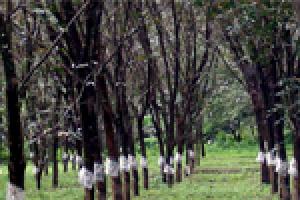Rubber is one part of life of the people of the South, related both to the culture and economy of the last 108 years. The monoculture production system has replaced a traditional system of rubber forests, where rubber used to be grown in amongst fruit orchards and natural forests known as a suan somrom or “integrated garden”. Rubber plantations have been promoted through the government’s Welfare Fund for Rubber Plantations.
Thailand
Other information
15 December 2008
Other information
15 December 2008
Thailand is making big plans, in particular for the next ten years, to boost agrofuel production particularly through expansion of oil palm plantations. However, the plans are not going anywhere yet due to the price volatility of agrofuel feedstock like palm oil and sugar as well as growing environmental concerns.
Thailand has two types of agrofuels: gasohol (mixture of gasoline and ethanol) and biodiesel. Gasohol made by mixing gasoline with 10% ethanol is called E10 (Gonsalves 2006).
Other information
18 August 2008
WRM information sheets on GE tree research
First posted: 18 August 2008
Last update: August 2014
Forest tree species being manipulated:
rubber tree (1)
Aim of genetic manipulation
Other information
23 February 2008
By Ms Sayamol Kaiyoorawong and Ms Bandita Yangdee - Project for Ecological Awareness Building
Other information
2 February 2008
The recent study “Rights of rubber farmers in Thailand under free trade”, by Ms Sayamol Kaiyoorawong and Ms Bandita Yangdee, [http://www.wrm.org.uy/countries/Thailand/Rights_of_rubber_farmers_in_Thailand.pdf],makes a thorough review of the whole rubber business and its actors in that country.
Other information
5 December 2007
Old proposals of damming the Lower Mekong River were revived recently. According to press releases from the Thailand-based NGO TERRA, the governments of Lao PDR, Cambodia and Thailand have granted permission to Thai, Malaysian and Chinese companies, to conduct feasibility studies for up to six large hydro dams on the lower Mekong. Ten years ago the projects had been dismissed for their huge cost and potential environmental damage.
Other information
5 December 2007
The National Legislative Assembly (NLA), set up after the military coup in Thailand last year and due to be disbanded following the general election on 23 December, has, in its dying breaths, approved the long awaited Community Forest Bill. Rather than consolidating the constitutional rights of all communities to manage their forest areas however, the NLA chose instead to exclude the rights of communities who are living outside the “conservation zones” to take part in forest management.
Other information
19 June 2007
Advance Agro is one of Thailand's largest pulp and paper companies, producing 427,000 tonnes of pulp and 470,000 tonnes of paper a year. The company markets its "Double A" brand of photocopy paper with a series of environmental claims. In May 2007, an Australian company called Access Economics added to these claims with a report titled "Environmental Benefits of Double A Paper".
Other information
23 May 2007
The Thai government has set its policy on producing palm oil-based biodiesel as energy. At present, the country’s large-scale oil palm harvest areas account to around 400,000 hectares, but since 2006, a discourse on oil palm has emerged to promote its plantation as a “renewable source of energy”, a “country savior”, a “reforestation scheme”, a “wind-protection zone”, and a “transformation of deserted rice fields into palm fields”.
Bulletin articles
29 December 2006
Large-scale rubber, oil palm, eucalyptus and pine tree plantations are being promoted by governments in Cambodia, China, Laos, Thailand and Vietnam. However, affected villagers are openly protesting against them. At a meeting held last month in Cambodia we learned that local communities are strongly opposing these plans because they see that these plantations are encroaching on their lands and impacting on their livelihoods.
Other information
29 December 2006
“During our time together, we heard directly from local community representatives from twelve provinces in Cambodia and also from other countries in the region about how their lives, livelihoods and environments are affected by large plantations in their respective areas.”
Bulletin articles
7 April 2006
Aung Ngyeh, a 31 year old Karenni, fled to Thailand in 2002, forced out of his home in Karenni State by the Burmese military’s war against ethnic populations. He now lives in the refugee camp along the Thai border working with the Karenni Development Research Group (KDRG) campaigning to stop foreign investment in the Burmese regime’s “development” projects.


